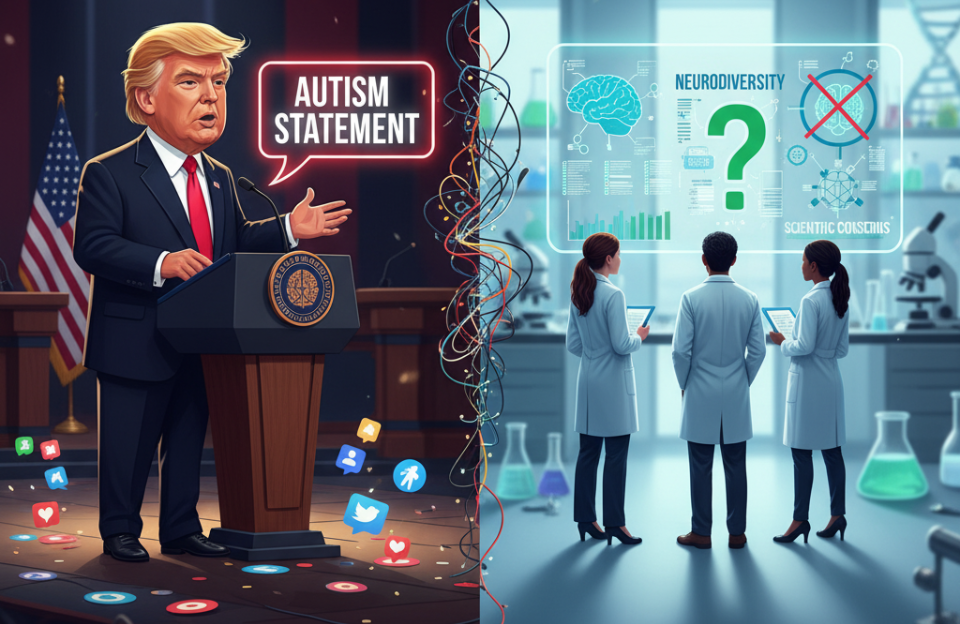In recent days, the phrase “Trump autism announcement” has become prominent in political headlines and social media debates. Former President Donald Trump has once again stirred public discussion—this time over claims pertaining to autism, medical treatment, and political messaging. But what exactly is being said, how credible are the claims, and what are the larger implications when politics, science, and mental health overlap?
Key Takeaways
- The “Trump autism announcement” has sparked debate about politics and science.
- Autism has no proven prenatal treatment or prevention—current evidence points to complex genetic and environmental factors.
- Experts caution against unverified medical claims, especially during pregnancy.
- Early intervention therapies (speech, behavioral, occupational) are proven to help children with autism thrive.
- Political figures making medical statements can influence public trust and health decisions, for better or worse.
What Was Announced
The core of the announcement involves statements attributed to Trump about autism. According to multiple sources, Trump allegedly claimed that certain treatment protocols—some quite controversial—are effective or necessary in pregnancy or early life to prevent or mitigate autism. The various reports differ on specifics: which treatments were mentioned, at what stage (pregnancy, infancy, toddler years), and whether Trump suggested mandatory screening or intervention.
While the “announcement” is informal (made at a rally, during interviews, or in public commentary rather than through a peer-reviewed journal or scientific body), it has nevertheless prompted widespread attention.
Reactions from the Medical Community
Experts in neurology, pediatrics, psychiatry, and epidemiology have responded quickly and pointedly. Key takeaways:
- Lack of scientific consensus: As of today, there is no reliable, broadly accepted evidence that any prenatal treatment guarantees the prevention of autism. There are risks associated with proposing medical interventions without robust clinical trials.
- Concerns about misinformation: When public figures make medical claims, especially about conditions like autism (whose causes are complex and multifactorial), there is a risk that people may adopt unverified or unsafe practices.
- The importance of nuance: Autism spectrum disorder (ASD) is heterogeneous. Variation in severity, outcomes, and supportive interventions means that “one-size-fits-all” claims are oversimplifications. Experts stress that while early diagnosis and therapies (such as behavioral, occupational, and speech therapies) can help, there’s no single cure or universally accepted preventive intervention.
Political & Social Implications
In the political arena, the “Trump autism announcement” has several ripple effects:
- Mobilizing base and critics
Supporters of Trump may view the announcement as part of his pattern of positioning himself as uniquely willing to take controversial stances. Opponents view it as another instance of scientific overreach and the danger of policy being guided by rhetoric over evidence. - Public trust & health behavior
When leaders make claims about health, especially about prenatal care or treatments for autism, it can influence what people believe or do. This can be beneficial when based on peer-reviewed science, but risky if based on preliminary or fringe ideas. - Media dynamics
Headlines with phrases like “Trump claims,” “Trump says,” and “Trump announcement” tend to generate clicks and polarization. This heightens the need for fact-checking and clear communication from trusted health organizations.
What We Know, What We Don’t
Here are the open questions, and what current evidence suggests:
| Claim | What’s Supported / Known | What’s Still Unclear or Unsupported |
| Autism causes | Genetic factors play a major role; environmental factors are investigated; consensus that it is multifactorial. | No definitive prenatal treatment or intervention proven to “prevent” autism in otherwise typical pregnancies. |
| Early intervention | Access to speech, behavioral, and developmental therapies improves outcomes for many children diagnosed with autism. | Whether any prenatal or very-early treatment can significantly alter the overall ASD risk profile remains unproven. |
| Safety of proposed treatments | Some treatments touted in popular media lack rigorous testing; some may carry risks during pregnancy. | Long-term safety and efficacy data are often missing. |
Why This Matters
Discussions like these are not just academic. They influence public policy (e.g. funding for research, regulation of medical advice), personal decision-making (expectant parents, caregivers), and social stigma (how autism is viewed, what “normal development” is expected). The “Trump autism announcement” is especially powerful because it merges celebrity, politics, and science—a combination that often amplifies both impact and misunderstanding.
Bottom Line
- The announcement labeled “Trump autism” is provocative but not definitive: many claims appear to go beyond solid scientific consensus.
- Scientific experts emphasize the need for caution: complex biological phenomena, such as autism, require well-designed research, reproducible evidence, and ethical considerations.
- For the public: it’s wise to look for information from trusted medical sources (hospitals, peer-reviewed journals, public health authorities) rather than taking controversial statements at face value.
FAQs
Q1. What exactly did Trump say about autism?
Trump suggested that certain treatments could prevent or reduce autism risk, but details are unclear and not backed by scientific consensus.
Q2. Is there a known way to prevent autism during pregnancy?
No. Current research shows autism is influenced by genetics and environment, but no prenatal intervention has been proven to prevent it.
Q3. What does science say about the causes of autism?
Autism is multifactorial, involving both genetic predispositions and environmental factors. No single cause or cure exists.
Q4. Can early intervention help children with autism?
Yes. Evidence supports early access to therapies like speech, behavioral, and occupational therapy, which improve developmental outcomes.
Read more: What are the early Intervention for Autism?
Q5. Why are experts critical of the Trump autism announcement?
Because making unverified medical claims risks spreading misinformation, which could lead families to unsafe or ineffective practices.
Mariam holds an MS in Sociology and brings a sharp, people-centered perspective to her writing. She contributes to multiple websites, covering business, current news, and trending topics with insight and creativity that connects with readers.
